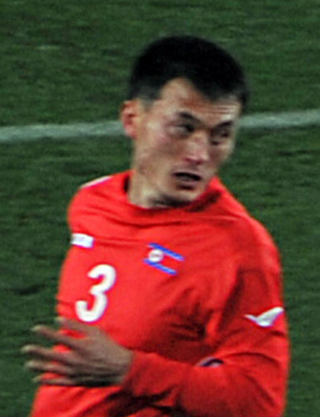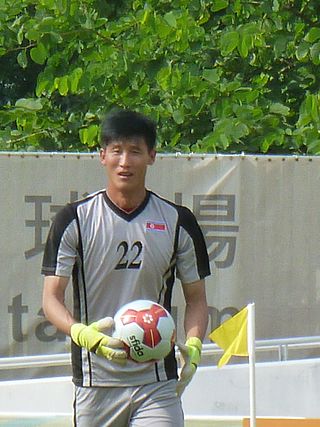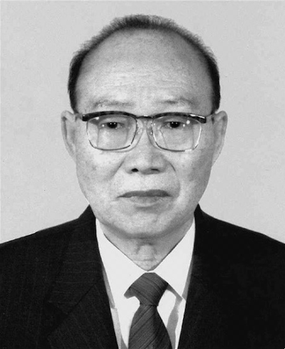Related Research Articles

Jo Myong-rok was a North Korean military officer who held the military rank Chasu. In 1998, he was appointed first vice-chairman of the National Defence Commission of North Korea, Director of the Korean People's Army General Political Bureau. Previously, he was the commander of the air defence forces.

The Socialist Patriotic Youth League is the main North Korean youth organization. Directly under the party Central Committee, it is the only mass organization expressly mentioned in the charter of the Workers' Party of Korea. Youth under 15 may join the Young Pioneer Corps, itself a part of the larger Korean Children's Union. The organization, modeled after the Komsomol in the former Soviet Union, includes all North Koreans without party membership between the ages of 15 and 30, although married women who opt to become housewives are transferred to the Socialist Women's Union. Officially, the guiding ideology of the organization is Kimilsungism–Kimjongilism.
The Yan'an faction were a group of pro-China communists in the North Korean government after the division of Korea following World War II.

Parliamentary elections were held in North Korea on 8 March 2009 to elect the members of the 12th Supreme People's Assembly. They were originally scheduled to be held in August 2008 but were postponed for unknown reasons. Observers of North Korea speculated that it was in relation to Kim Jong-il's ill health.

Parliamentary elections were held in North Korea on 25 August 1948 to elect the members of the 1st Supreme People's Assembly. Organised by the People's Committee of North Korea, the elections saw 572 deputies elected, of which 212 were from North Korea and 360 from South Korea.

Parliamentary elections were held in North Korea on 27 August 1957 to elect members of the 2nd Supreme People's Assembly. Voters were presented with a single list from the Democratic Front for the Reunification of the Fatherland, dominated by the Workers' Party of Korea.

The Central Military Commission of the Workers' Party of Korea (CMC) is an organ of the Central Committee of the Workers' Party of Korea (WPK) which heads the Korean People's Army (KPA).

Ri Jun-Il is a North Korean professional footballer who currently plays as a defender for Sobaeksu in DPR Korea League.

Ri Kwang-il is a North Korean international football player. He played for Sobaeksu in the DPR Korea League.

The death of Kim Jong Il was reported by North Korean state television news on 19 December 2011. The presenter Ri Chun-hee announced that he had died on 17 December at 8:30 am of a massive heart attack while travelling by train to an area outside Pyongyang. Reportedly, he had received medical treatment for cardiac and cerebrovascular diseases, and during the trip, Kim was said to have had an "advanced acute myocardial infarction, complicated with a serious heart shock". However, it was reported in December 2012 by South Korean media that the heart attack had instead occurred in a fit of rage over construction faults in a crucial power plant project at Huichon in Chagang Province.
Parliamentary elections were held in North Korea on 9 March 2014 to elect the members of the 13th Supreme People's Assembly.

In North Korea, the Political Bureau of the Central Committee of the Workers' Party of Korea (WPK), or simply the Politburo, formerly the Political Committee (1946–61), is the highest decision-making body in the ruling party between sessions of its Central Committee. Article 25 of the Party Charter stipulates that "The Political Bureau of the Party Central Committee and its Standing Committee organize and direct all party work on behalf of the party Central Committee between plenary meetings. The Political Bureau of the Party Central Committee shall meet at least once every month." The Politburo is elected by the Central Committee of the Workers' Party of Korea.

Kim Kuk-thae was an elder apparatchik of the Workers' Party of Korea, the ruling party in North Korea.
Events from the year 2007 in North Korea.
Events from the year 1998 in North Korea.

Ri Su-yong, also known as Ri Chol (이철), is a North Korean diplomat and politician, serving as the Minister of Foreign Affairs of North Korea from April 2014 until May 2016.

Mu Chong, born Kim Mu-chong (김무정), was a Korean communist, independence activist, general and statesman of North Korea. He had been living in China for years when he joined the Chinese Communist Party fighting against the Japanese. After the liberation of Korea, he returned to North Korea and became a general in the Korean People's Army. He was an important member of the Yan'an faction, a group of pro-China communists in the North Korean government.

The Presidium of the Political Bureau of the Workers' Party of Korea, or simply the Presidium, and formerly known as the Standing Committee (1946–61), is a committee consisting of the top leadership of the Workers' Party of Korea. Historically, it has been composed of one to five members, and currently has five members. Its officially mandated purpose is to conduct policy discussions and make decisions on major issues when the Politburo, a larger decision-making body, is not in session. While the Presidium in theory reports to the Politburo, which in turn reports to the larger Central Committee, in practice the Presidium is supreme over its parent bodies and acts as the most powerful decision-making body in North Korea. As North Korea is a one-party state, the Presidium's decisions de facto have the force of law. Its role is roughly analogous to that of the Politburo Standing Committee of the Chinese Communist Party.
Ri Thong-il is a North Korean footballer who plays as a defender for Kigwancha and the North Korea national team.

Hwang Sun-hui was a North Korean politician who served in several high-ranking positions in the Workers' Party of Korea (WPK), including in the Supreme People's Assembly and the Central Committee of the WPK. She was affiliated with the Korean Revolution Museum from 1965, and was its director from 1990.
References
- ↑ Ri Chong-il at National-Football-Teams.com
